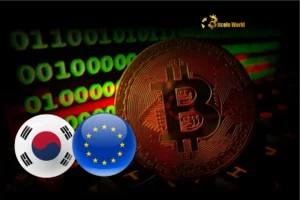South Korea Crypto Regulation: Urgent New Verification Rules Impact Exchanges and Nonprofits

BitcoinWorld
South Korea Crypto Regulation: Urgent New Verification Rules Impact Exchanges and Nonprofits
Big news from the world of cryptocurrency regulation! If you’re involved with or interested in the South Korean crypto market, you need to pay attention. The nation’s financial watchdog, the Financial Services Commission (FSC), is rolling out significant changes aimed at bolstering the fight against money laundering. These new rules, specifically targeting customer verification for certain entities, are set to take effect very soon.
Understanding the Latest South Korea Crypto Regulation
The core of the new policy announced by South Korea’s Financial Services Commission (FSC) is a strengthening of Know Your Customer (KYC) and Anti-Money Laundering (AML) procedures. This isn’t entirely new territory for the crypto space, but the focus and scope are being specifically enhanced for two particular groups: nonprofit organizations and other crypto exchanges.
Why these groups? Nonprofits, while often legitimate, can sometimes be exploited for illicit financial flows. Similarly, transactions between different crypto exchanges can obscure the origin and destination of funds, making them potential pathways for money laundering.
The key date to remember is June. Starting then, these entities will face stricter scrutiny when engaging with the regulated financial system, particularly when it comes to buying or selling digital assets through established channels.
What Does This Mean for Crypto Exchanges South Korea?
For crypto exchanges operating within South Korea, this new regulation introduces additional layers of responsibility. Currently, exchanges already perform KYC on individual users. However, the enhanced rules require them to go deeper when dealing with two specific types of customers:
Nonprofit Organizations: Any nonprofit wishing to transact on an exchange will be subject to more rigorous checks regarding the source of their funds and the intended use of the cryptocurrency or fiat involved.
Other Crypto Exchanges: When one South Korean exchange interacts with another (e.g., for large transfers or settlements), both parties will need to verify the legitimacy and purpose of the transaction.
The primary mandate for exchanges under these rules is to verify the origin and purpose of incoming crypto deposits. This means understanding where the crypto came from before it hit their platform and why it’s being deposited.
The Role of AML Crypto Measures in South Korea
Anti-Money Laundering (AML) is a global effort to prevent criminals from disguising illegally obtained funds as legitimate income. The cryptocurrency sector, due to its pseudonymous nature and cross-border capabilities, has long been identified as an area vulnerable to money laundering risks. South Korea, being a major hub for crypto trading, is particularly keen to reinforce its defenses.
These new measures are a direct response to the evolving landscape of financial crime. By requiring exchanges and banks to scrutinize the source and purpose of transactions involving higher-risk entities like nonprofits and inter-exchange transfers, the FSC aims to make it significantly harder for illicit funds to move through the regulated financial system using crypto as a vehicle.
Think of it like adding extra checkpoints on specific highways known to be used by suspicious vehicles. It’s about targeting potential weak points in the system.
How the FSC South Korea is Implementing the Changes
The Financial Services Commission (FSC) is the principal regulatory body overseeing financial markets in South Korea, including the burgeoning crypto sector. Their approach involves not only directing crypto exchanges but also the traditional banks that provide them with fiat on/off-ramps.
Here’s a breakdown of who does what:
Crypto Exchanges: Responsible for verifying the source and purpose of *incoming crypto deposits* from nonprofits and other exchanges.
Banks: Responsible for verifying the source and purpose of *fiat withdrawals* resulting from crypto sales when these withdrawals are made through verified accounts linked to nonprofits or exchanges.
This dual approach ensures that scrutiny is applied at both the crypto entry point (exchange deposits) and the fiat exit point (bank withdrawals), creating a more robust control mechanism. The FSC is essentially leveraging the existing financial infrastructure (banks) to reinforce oversight on the newer crypto infrastructure (exchanges).
Impact of the New Crypto Verification Rules
What are the potential consequences of these strengthened crypto verification rules? There are several angles to consider:
Benefits:
Increased Legitimacy: Stricter rules can enhance the perception of the South Korean crypto market as safer and more compliant, potentially attracting more institutional interest.
Reduced Crime: Makes it harder for criminals and sanctioned entities to use South Korean platforms for illicit activities.
Enhanced Stability: A cleaner market is less susceptible to shocks related to financial crime investigations.
Challenges:
Implementation Burden: Exchanges and banks will need to update their compliance systems, train staff, and potentially increase operational costs.
Potential for Delays: More rigorous checks could potentially slow down transactions involving nonprofits or inter-exchange transfers.
Defining ‘Purpose’: Determining the legitimate ‘purpose’ of a transaction can sometimes be subjective and complex.
Actionable insights for affected parties include reviewing current compliance protocols, preparing for increased documentation requirements, and ensuring staff are adequately trained on the new procedures before the June deadline.
Conclusion: Navigating South Korea’s Evolving Crypto Landscape
South Korea’s move to tighten crypto verification rules for nonprofits and exchanges starting in June underscores the global trend towards greater regulatory oversight in the digital asset space. The FSC South Korea is clearly prioritizing the mitigation of AML crypto risks by placing specific verification burdens on key players like crypto exchanges South Korea and the banks that serve them.
While these crypto verification rules may introduce some operational challenges, they are ultimately aimed at fostering a more secure and legitimate trading environment. As the market matures, such regulatory adjustments become necessary steps in balancing innovation with financial stability and security. Market participants should prepare diligently for these changes to ensure continued compliance and smooth operations within the evolving South Korean crypto regulation framework.
To learn more about the latest crypto regulation trends, explore our article on key developments shaping the global crypto market.
This post South Korea Crypto Regulation: Urgent New Verification Rules Impact Exchanges and Nonprofits first appeared on BitcoinWorld and is written by Editorial Team







